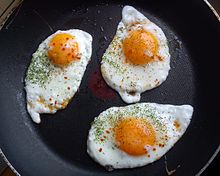lac·to-o·vo-veg·e·tar·i·an
/ˌlaktōˌōvōˌvejəˈterēən/
noun
- a person who eats vegetables, eggs, and dairy products but who does not eat meat.
Web results
Sep 26, 2018 - When most people think of vegetarians, they think of lacto-ovo-vegetarians: People who do not eat beef, pork, poultry, fish, shellfish, insects or animal flesh of any kind, but do eat eggs and dairy products are lacto-ovo vegetarians (“lacto” comes from the Latin for milk, and “ovo” for egg).
begin quote from:
An ovo-lacto vegetarian or lacto-ovo vegetarian is a vegetarian who consumes some animal products, such as eggs and dairy. Unlike pescatarians, they do not consume fish or other seafood.
Ovo-lacto vegetarianism
This article needs additional citations for verification. (March 2017) (Learn how and when to remove this template message)
|
An ovo-lacto vegetarian or lacto-ovo vegetarian is a vegetarian who consumes some animal products, such as eggs and dairy. Unlike pescatarians, they do not consume fish or other seafood. A typical ovo-lacto vegetarian diet includes fruits, vegetables, grains, nuts, seeds, herbs, roots, fungi, milk, cheese, yogurt, kefir, and eggs.[1]
Etymology[edit]
The terminology stems from the Latin lac meaning "milk" (as in 'lactation'), ovum meaning "egg", and the English term vegetarian, so as giving the definition of a vegetarian diet containing milk and eggs.
Diet[edit]
In the Western world, ovo-lacto vegetarians are the most common type of vegetarian.[2] Generally speaking, when one uses the term vegetarian, an ovo-lacto vegetarian is assumed.[3] Ovo-lacto vegetarians are often well-catered to in restaurants and shops, especially in some parts of Europe and metropolitan cities in North America.
Religion[edit]
Jainism prohibits causing harm to anything with a soul or potential life. Traditionally this includes eggs and certain kinds of vegetables, as well as animals, but dairy products are permitted. Jains are therefore lacto vegetarians, not ovo-lacto vegetarians.[4]
The Bible Christian Church was a Christian vegetarian sect founded by William Cowherd in 1809.[6] Cowherd was one of the philosophical forerunners of the Vegetarian Society founded in 1847. The Bible Christian Church promoted the use of eggs, dairy and honey as God's given food per "the promised land flowing with milk and honey" (Exodus 3:8).[7]
Many Seventh-day Adventist followers are lacto-ovo vegetarians. For over 130 years, Seventh-day Adventists have recommended a vegetarian diet which may include milk products and eggs.[8]
Ovo-vegetarianism in India[edit]
In India, eggs are not universally considered vegetarian; those who do practice ovo-vegetarianism are often described as "eggetarians". To accommodate this, products containing eggs are specially marked to differentiate them from otherwise vegetarian food products. Some manufacturers specifically advise that their products contain eggs but not meat or animal products to avoid diminishing interest among those who practice ovo-vegetarianism.[9]



No comments:
Post a Comment